This is part of a series of interviews with leaders from international partner organisations. We asked them to weigh in on the importance of our proposed merger with the International Social Science Council (ISSC) for a fast-changing scientific future.

This is the third part of a regular series being published between now and the historic joint meeting of our members in Taipei this October. If agreed, the merger will mark the culmination of several decades of debate about the need for more effective collaboration between the natural and social sciences, and drive new ways of thinking about the role of all the sciences in responding to the complex challenges of the modern world.
The new organisation will be formally launched in 2018. To find out more about the proposed merger visit the gitbook page.
You can read part one of the series, “What do you think science is essentially for in the present age, and in the coming 30 years?”, and part two “What defines the global context of science today, and what sort of science is urgently needed?”
Erik Solheim, Head of UN Environment (UNEP): The success of the possible merger of the two Councils shall present a multidisciplinary opportunity to provide the scientific basis for an integrated approach of realizing the sustainable development goals (SDGs). The Future Earth initiative is a good pilot, but far from enough. The synergies of biophysical and social sciences will definitely assist national planners to take a holistic approach in making decisions on their national plans and implement them in an integrated manner.
Irina Bokova, Director General of United Nations Educational, Scientific and Cultural Organization (UNESCO): The vision of science necessary for the 2030 Agenda for Sustainable Development is interdisciplinary and inclusive. The ICSU/ISSC merger initiative reflects this vision and signals to policymakers the evolution of the different contexts of science, and that this particular interdisciplinary engagement should be seen as the new normal.
The merged ICSU/ISSC should be a step in the development of a culture of transformational science in which policy decisions are effectively and timely informed by the systematic assessment of the evidence base, generated by Science, that may be relevant to crucial areas of public policy-making.
UNESCO would find a privileged partner in the merged organisation. The new mandate anchored in the synergies between natural and social sciences would set a rich environment for continuous, strong and fruitful collaboration towards the mutual objective of transitioning to a sustainable and peaceful planet.
Guido Schmidt- Traub, Executive Director of UN Sustainable Development Solutions Network: A successful merger of these organisations would produce an operationally effective and reasonably well funded science body that can work across the full spectrum of sustainable development challenges. The funding question is essential since the merged entity needs to be able to undertake forward-looking work without having to constantly raise funds for basic operational expenditures.
Mohamed Hassan, Founding Executive Director of The World Academy of Sciences (TWAS): The combined organisation would reflect the reality of science today: There will be a growing interaction between natural and social sciences. For example, if we want to address climate change, we will have to consider how human behaviour or human cultural norms contribute to greenhouse gas emissions – and how behaviour and cultural norms could contribute to solutions. We need to understand economics, because economic dynamics contribute to climate change, and can contribute to a solution.
The ICSU-ISSC merger can make a major contribution to improving dialogue and permanent working relationships between the natural sciences, engineering sciences and social sciences. At the same time, this merger is a signal to policymakers and others that scientific realities are evolving, and that this particular dialogue and this particular multidisciplinary engagement should be seen as the new normal.
Charlotte Petri Gornitzka, Chair of the OECD Development Assistance Committee (DAC): That’s a very difficult question, but normally you can tell that a change process was successful after some years when staff and stakeholders spontaneously describe the advantages of the change.
Swedish International Development Cooperation Agency (Sida): A successful merged organisation will be one that promotes equal access and contribution to global knowledge and that can offer an intellectual critique of salient and long term global concerns, concurrently to considering local issues.
InterAcademy Partnership (IAP): ICSU and ISSC are extremely valuable institutions to the global research enterprise, and a successful merger will allow the new organization to enhance the value it delivers to its national and disciplinary union members while expanding its efforts to work across disciplines and national boundaries to ensure that global science works as a more cohesive and effective entity.
Marlene Kanga, President-Elect of the World Federation of Engineering Organizations (WFEO): The combined ICSU and ISSC will be able to bring a diversity of thought to developing policy frameworks to address the global problems that the world is facing. The two organisations can develop international strategies so that no one is left behind, a key aspiration of the UN Sustainable Development Goals.
Chao Gejin, President of the International Council for Philosophy and Human Sciences (CIPSH): It seems the merger of the ICSU/ISSC is unavoidable. Cooperation is always better than isolation.
Erik Solheim is head of UN Environment @ErikSolheim
Irina Bokova is Director General of UNESCO @IrinaBokova
Guido Schmidt-Traub is Executive Director of the UN Sustainable Development Solutions Network @GSchmidtTraub
Mohamed Hassan is TWAS Founding Executive Director @TWASNews
Charlotte Petri Gornitzka is Chair of the OECD Development Assistance Committee (DAC) @CharlottePetriG
InterAcademy Partnership @IAPartnership
Marlene Kanga is President-Elect of the World Federation of Engineering Organizations @WFEO
Swedish International Development Cooperation Agency (Sida) @Sida
Chao Gejin is President of the International Council for Philosophy and Human Sciences (CIPSH)
[related_items ids=”4356,1489″]